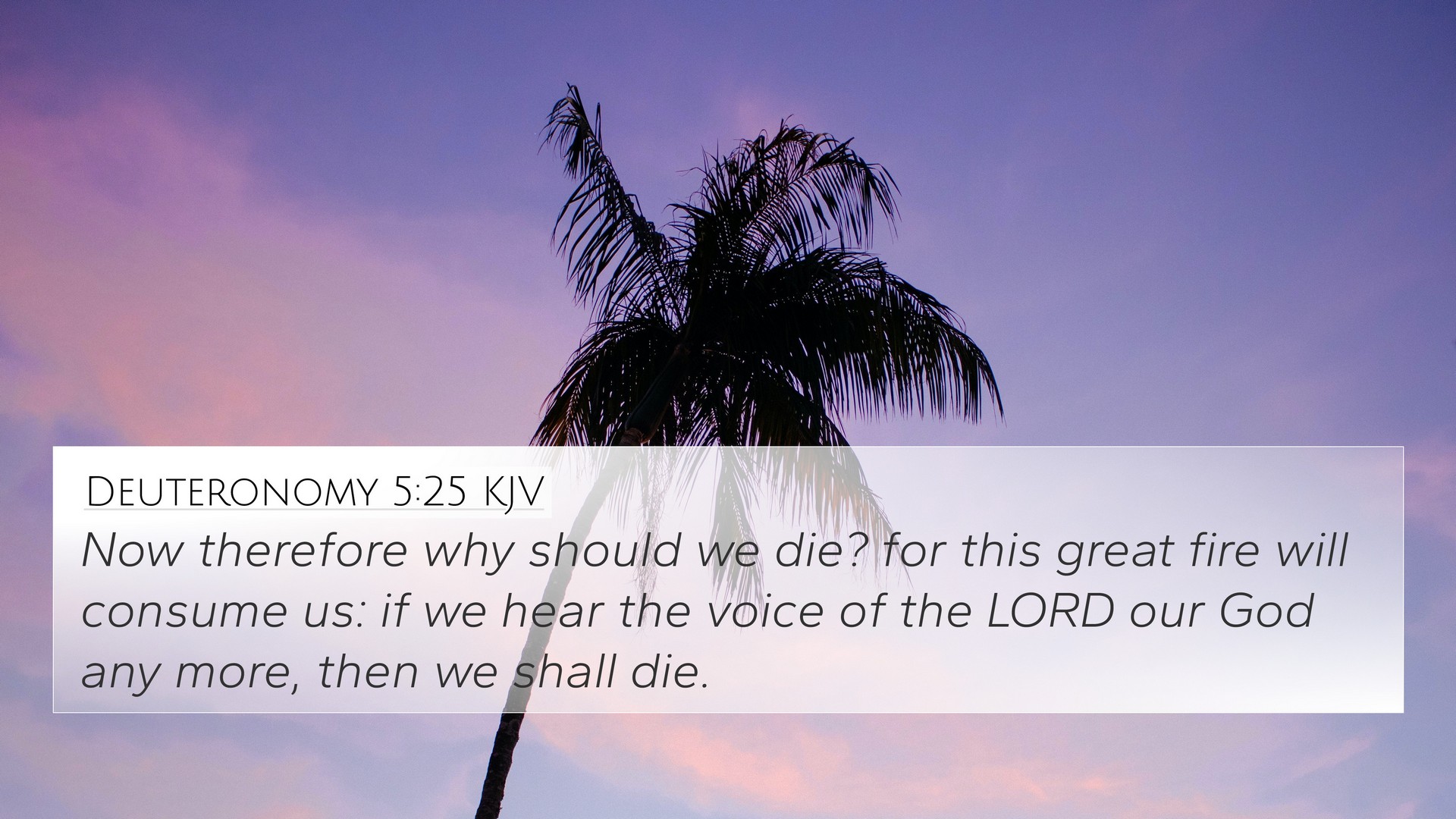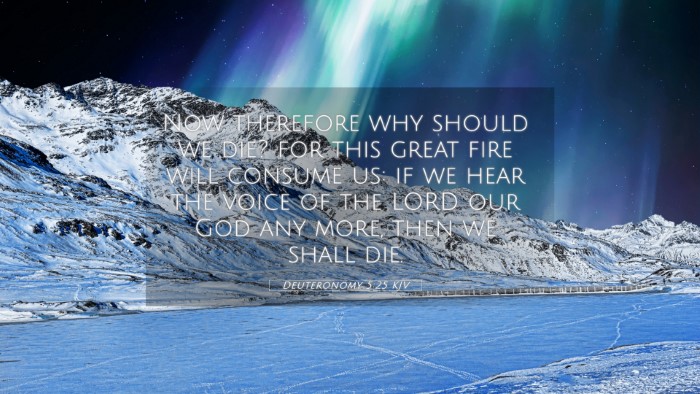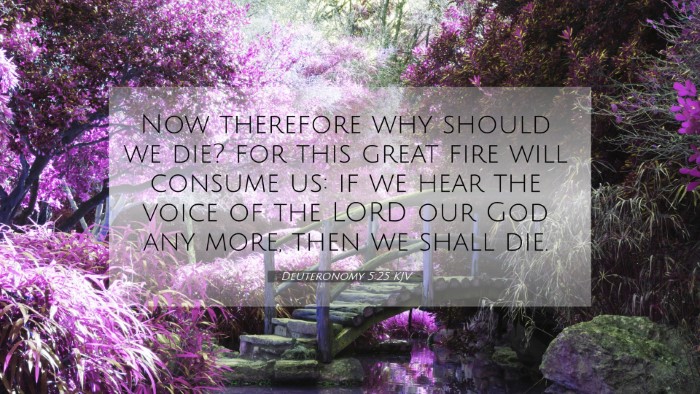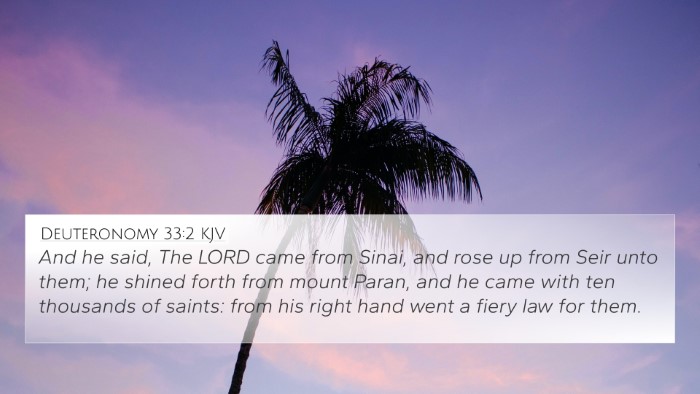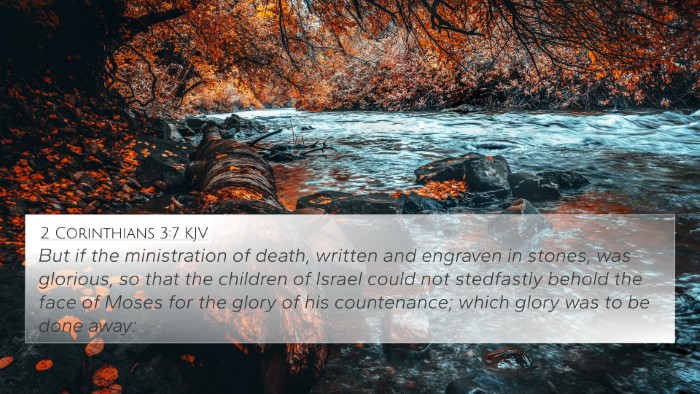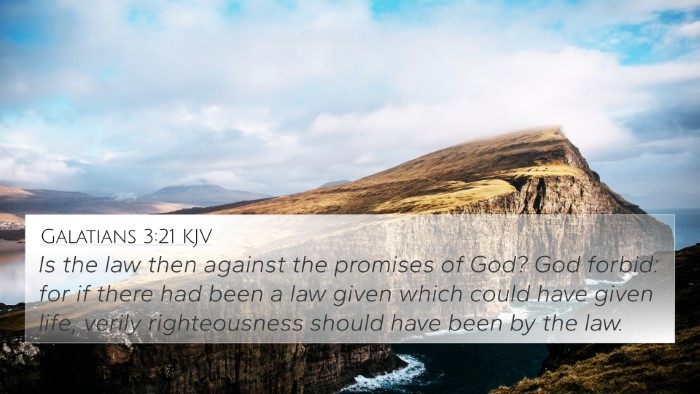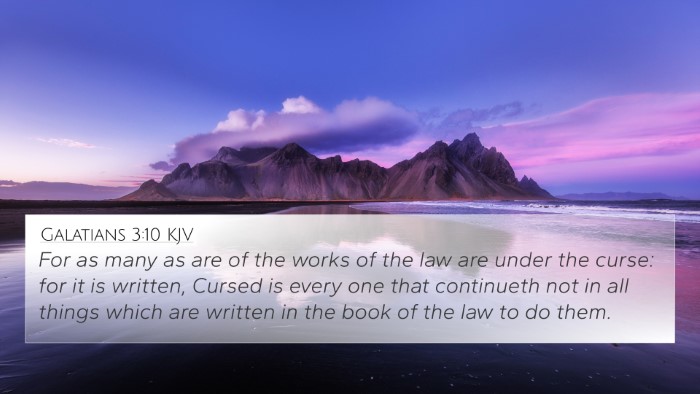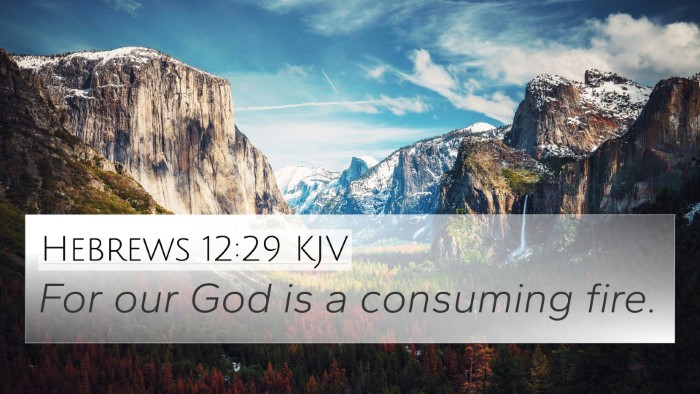Understanding Deuteronomy 5:25
Bible Verse: Deuteronomy 5:25
“But now, why should we die? For this great fire will consume us; if we hear the voice of the Lord our God any longer, we shall die.”
Summary of Meaning
Deuteronomy 5:25 reflects the profound fear and apprehension of the Israelites in the presence of God. After receiving the commandments, they express their terror at the overwhelming holiness and glory of God, which they believe could lead to their demise should they continue to hear His voice. This verse captures the essence of the human response to divine holiness—fear and an understanding of one's own frailty.
Insights from Commentaries
Matthew Henry's Commentary
Matthew Henry emphasizes the gravity of the Israelites' situation. He notes that their fear stems not only from the perception of God as a consuming fire but also from their recognition of their own sinful state. The Israelites express a collective realization that encountering God’s voice and presence without a mediator is perilous. Henry further describes God's holiness as something that should inspire reverence rather than casual familiarity.
Albert Barnes' Commentary
Albert Barnes elaborates on the theme of God's majesty and the rightful fear it instills in mankind. He highlights that the Israelites had witnessed God's power and glory firsthand, leading them to rightly conclude that continued exposure to such holiness could lead to death. Barnes links this sentiment with the expectation of a mediator—Moses—who stands between God and the people, illustrating the need for intercession in experiencing divine communication safely.
Adam Clarke's Commentary
Adam Clarke offers an interpretive view by contextualizing this fear within the broader narrative of the Exodus. He reflects on how fear of death amidst God's grandeur is a natural human response. Clarke posits that this cry reveals the Israelites' understanding of their unworthiness and their desire for safety, which is assured only through God's appointed spokesperson, Moses. Clarke also points out that this encounter with God's voice signifies a larger theological truth about the need for mediation between the divine and humanity.
Related Bible Cross References
- Exodus 20:18-19 - The people's fear of the thunder and lightning and their plea for Moses to speak to God instead.
- Hebrews 12:29 - "For our God is a consuming fire," highlighting God's holiness.
- 1 Timothy 2:5 - "For there is one God, and one mediator between God and men, the man Christ Jesus," illustrating the need for a mediator.
- Romans 8:15 - Discusses the spirit of fear versus the spirit of adoption, contrasting fear of God and intimacy with Him.
- Numbers 17:12-13 - The Israelite response to God's judgment, showing their understanding of divine authority and fear of death.
- Isaiah 33:14 - The sinners in Zion are afraid, showing a historical context of fear when facing a holy God.
- Revelation 1:17 - "Fear not," indicating the transformation in relationship with God through Christ as opposed to the fear in Deuteronomy.
Thematic Bible Verse Connections
Deuteronomy 5:25 serves as a rich text for thematic exploration across the Scriptures:
- The Fear of God - The recurring theme of God's holiness and humanity's fear can be seen in several accounts, helping to understand how divine encounters shift the paradigm of relationship with God.
- Mediation Between God and Man - The understanding of a mediator is pivotal; the transition from Moses to Christ elucidates the development of this theological concept.
- Human Sinfulness versus Divine Holiness - A tension found throughout scriptures that helps believers realize the need for grace and redemption.
- The Covenantal Relationship - Understanding God's desire for a relationship with humanity despite their fears, which ultimately leads to a fulfillment in Christ.
Insights for Cross-Referencing and Study
When exploring Deuteronomy 5:25, one can utilize various tools for cross-referencing:
- Bible Concordance - To find specific themes or words related to fear and the holiness of God.
- Bible Cross-Reference Guide - Utilize resources that connect this verse with other pertinent scripture, enhancing understanding through comparative Bible verse analysis.
- Cross-Reference Bible Study - Methods for comparing verses can deepen insights into Scripture’s interconnectedness.
- Comprehensive Bible Cross-Reference Materials - Employ these for richer thematic exploration and historical context.
Applications of Cross-Referencing in Study
Understanding how to find cross-references in the Bible can greatly enhance one's study experience:
- Identify connections between Old and New Testament teachings.
- Engage in a detailed cross-reference between Gospels to see different perspectives on divine encounters.
- Seek Bible verses related to specific themes such as fear or mediation to find relevant passages.
- Consider cross-referenced themes in the Bible for sermon preparation or personal reflection.
- Explore inter-Biblical dialogue to recognize how different authors and contexts bring further understanding to the same truths.
Conclusion
Deuteronomy 5:25 serves as a profound illustration of the human experience in encountering God’s holiness. The voices in the verse reflect a timeless struggle—understanding the nature of God while grappling with our own limitations. Engaging with this verse alongside related scriptures and cross-references encourages a deeper appreciation for the interconnectedness of God's Word and the overarching narrative of redemption.
